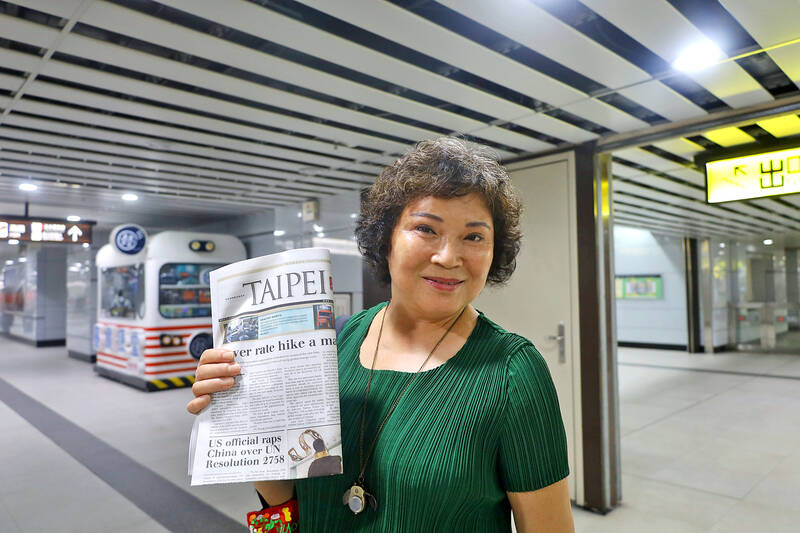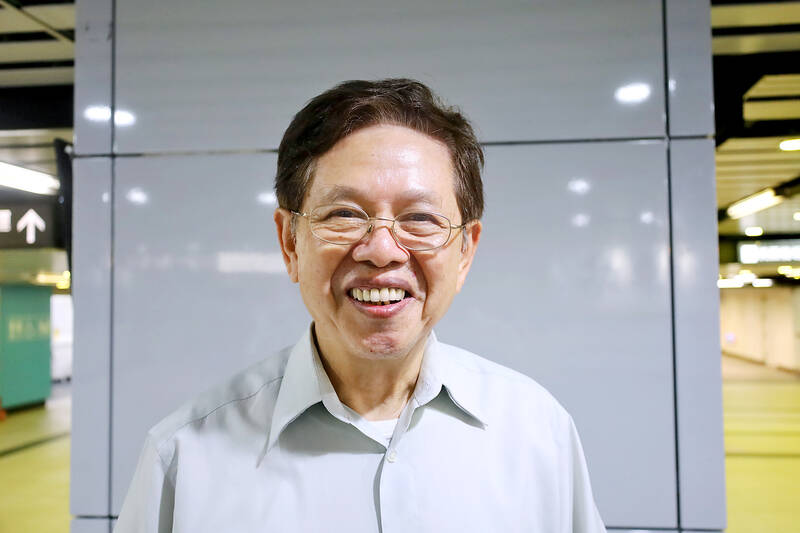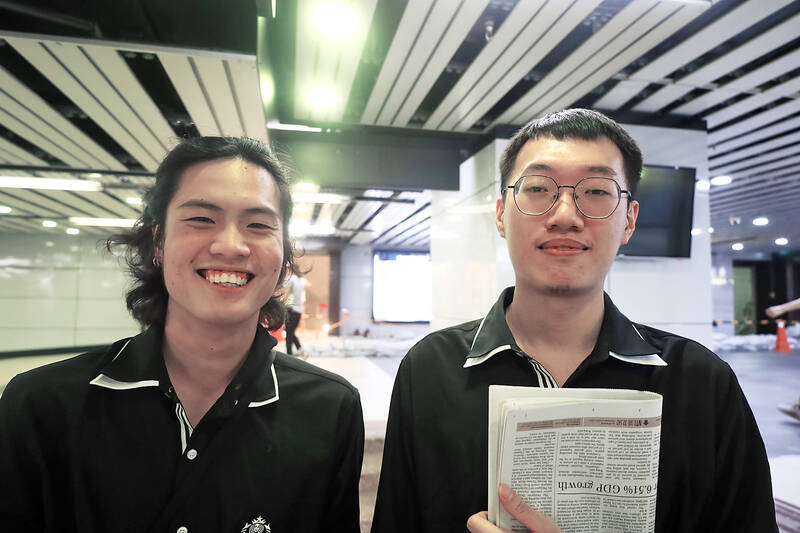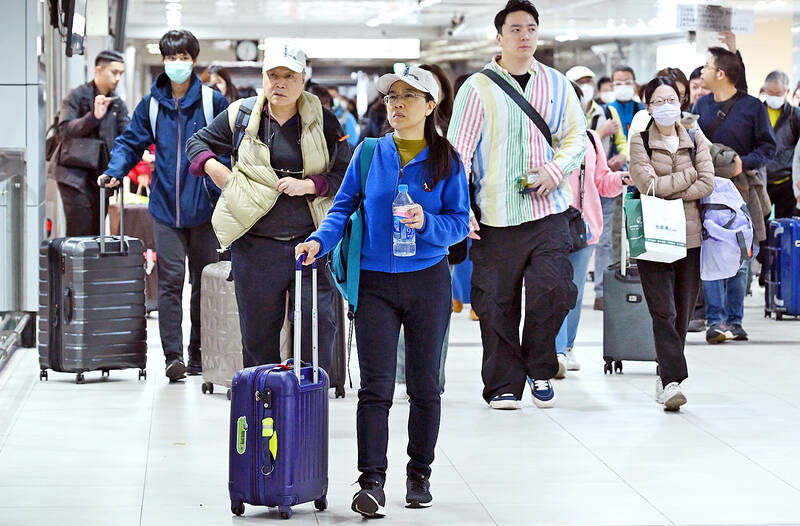After The People’s Republic of China (PRC) published 22 new guidelines on June 21 that allow its courts to try in absentia and sentence to death “Taiwan independence separatists,” the Mainland Affairs Council (MAC) upgraded its travel advisory to the PRC and the Special Administrative Regions (SARs) of Hong Kong and Macau to level 3, or “orange” alert, meaning Taiwanese nationals shouldn’t visit unless “absolutely necessary.”
Surveying commuters in Taipei’s bustling Main Station on Thursday, the Taipei Times found only 20 percent of people we spoke to had not heard that the travel alert had been raised to orange.
Similarly, only 30 percent had not heard of a Taiwanese traveler who was briefly held in Hong Kong due to his name being similar to a former Taiwan Statebuilding Party (TSP) legislator named Chen Po-wei (陳柏惟) when Romanized.

Photo: Daniel Oh
When asked if they’d consider visiting the PRC or the two SARs for work or tourism given the current travel advisory, 70 percent of respondents said they would not, with most expressing some concern for their safety in light of current cross-strait tensions. A troubling 30 percent of respondents said they’d even been worried transferring planes in a PRC or SAR airport.
However, Chang Cheng from New Taipei City said he’d visit Hong Kong again as he’d enjoyed his time there before and had a lot of friends in the territory. Similarly, 18-year-old Lin Chung-che, who has previously visited Shanghai, said he’d happily travel to the PRC or Hong Kong, although he has no immediate plans to do so.
A retired science teacher from Taipei who identified as Joe Kuo told the Taipei Times he’d been to the PRC 20 times in the past for tourism and work but wouldn’t go now due to safety concerns.

Photo: Daniel Oh
Similarly, 70-year-old retiree Lin Yu-chuan who has visited Hangzhou, Xiamen and Shanghai in the past and describes the landscape of the PRC as “beautiful” would not visit. Lin also bemoaned Hong Kong’s reduced appeal as a destination as somewhere that was “no longer lively” and in “economic decline,” which should “serve as a warning to Taiwan.”
Alice Lin, a 27-year-old teacher in New Taipei City, said she wouldn’t go in the current climate, although she maintains a dream to visit the pandas in their home environment of Sichuan and would do so should travel safety improve.
Only half of respondents said they’d let PRC policy influence travel opportunities in Myanmar, Laos or Cambodia — Southeast Asian countries with which Beijing maintains close ties and extradition treaties.

Photo: Daniel Oh
Kuo told the Taipei Times he simply wouldn’t visit any country that was “Communist” including Vietnam and North Korea.
When asked if they were concerned if any Western countries, which currently exclude “political offenses” from their extradition with China, might align with Beijing in the future, only 30 percent agreed, with most considering Western destinations “safe” in both the short and medium term.
However, Lin Ching-yu, a 36-year-old nurse, said “politics is always changing, you have to keep an eye on it and check up-to-date government warnings.”

Photo: Liao Chen-huei, Taipei Times
A freelancer from Tainan, Miss Liu, expressed concerns for any Taiwan national traveling to the Russia Federation, given Moscow’s strengthening ties with Beijing.
Of those we spoke with, only 30 percent felt they had done something that might make them a target of Beijing, including attending a Tiananmen Square Massacre vigil, arguing with PRC citizens online and gathering outside the Legislative Yuan to protest the recent reform bill.

The Taipei Times last week reported that the rising share of seniors in the population is reshaping the nation’s housing markets. According to data from the Ministry of the Interior, about 850,000 residences were occupied by elderly people in the first quarter, including 655,000 that housed only one resident. H&B Realty chief researcher Jessica Hsu (徐佳馨), quoted in the article, said that there is rising demand for elderly-friendly housing, including units with elevators, barrier-free layouts and proximity to healthcare services. Hsu and others cited in the article highlighted the changing family residential dynamics, as children no longer live with parents,

It is jarring how differently Taiwan’s politics is portrayed in the international press compared to the local Chinese-language press. Viewed from abroad, Taiwan is seen as a geopolitical hotspot, or “The Most Dangerous Place on Earth,” as the Economist once blazoned across their cover. Meanwhile, tasked with facing down those existential threats, Taiwan’s leaders are dying their hair pink. These include former president Tsai Ing-wen (蔡英文), Vice President Hsiao Bi-khim (蕭美琴) and Kaohsiung Mayor Chen Chi-mai (陳其邁), among others. They are demonstrating what big fans they are of South Korean K-pop sensations Blackpink ahead of their concerts this weekend in Kaohsiung.

Taiwan is one of the world’s greatest per-capita consumers of seafood. Whereas the average human is thought to eat around 20kg of seafood per year, each Taiwanese gets through 27kg to 35kg of ocean delicacies annually, depending on which source you find most credible. Given the ubiquity of dishes like oyster omelet (蚵仔煎) and milkfish soup (虱目魚湯), the higher estimate may well be correct. By global standards, let alone local consumption patterns, I’m not much of a seafood fan. It’s not just a matter of taste, although that’s part of it. What I’ve read about the environmental impact of the

Oct 20 to Oct 26 After a day of fighting, the Japanese Army’s Second Division was resting when a curious delegation of two Scotsmen and 19 Taiwanese approached their camp. It was Oct. 20, 1895, and the troops had reached Taiye Village (太爺庄) in today’s Hunei District (湖內), Kaohsiung, just 10km away from their final target of Tainan. Led by Presbyterian missionaries Thomas Barclay and Duncan Ferguson, the group informed the Japanese that resistance leader Liu Yung-fu (劉永福) had fled to China the previous night, leaving his Black Flag Army fighters behind and the city in chaos. On behalf of the